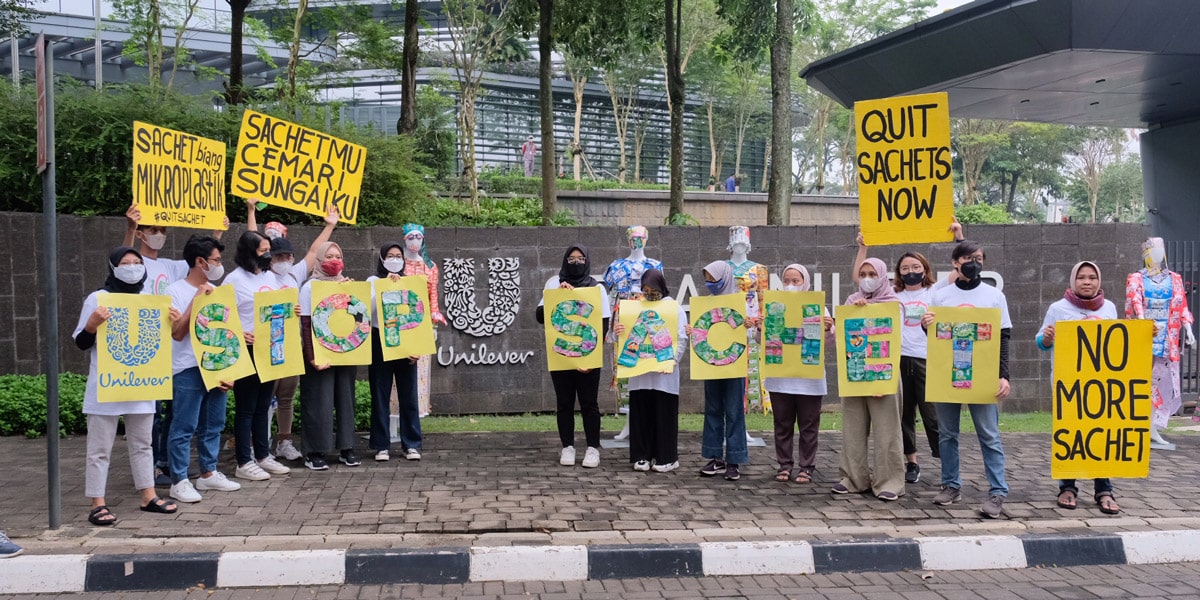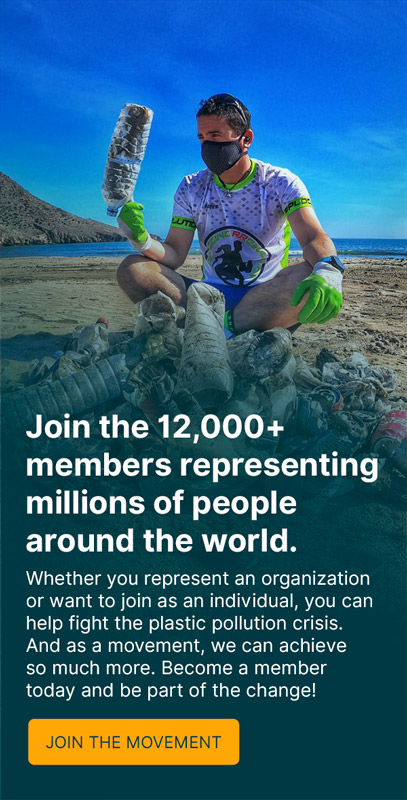JAKARTA (15 June 2022) - Environmental activists have gathered outside the Indonesia Convention Exhibition (ICE) Convention Center on Wednesday (June 15), where PT Unilever Indonesia Tbk is having its 2022 annual shareholders meeting, to urge the company to quit sachets. Members of the Alliance for Zero Waste Indonesia (AZWI) brought mannequins dressed up in Unilever-branded sachets, mostly collected from rivers across Indonesia.
According to the World Economic Forum, sachet plastic packaging accounts for 16 percent of plastic waste found in Indonesia’s waterways and environment. Likewise, #breakfreefromplastic brand audits identified sachets as one of the most frequently found plastic waste.
Prigi Arisandi, Executive Director of Ecological Observation and Wetlands Conservation (ECOTON), said that Unilever has consistently ranked among the top three corporate polluters in their recent brand audits in some big cities, which were done as part of their 300-day Nusantara River Expedition. Aside from doing brand audits, ECOTON also documented microplastic pollutants in the rivers. “Most of the microplastics pollution are filaments that have fragmented from plastic film and sachet packaging,” Prigi said.
Unilever has committed to making sure all plastic packaging, including sachets, can be reused, recycled, or compostable by 2025. It has also joined the call for a legally-binding global plastic treaty, in which the United Nations Environment Assembly agreed to account for the full plastics life cycle.
“We have repeatedly asked Unilever, as well as the Ministry of Environment and Forestry (MoEF), to share their Waste Reduction Roadmap, but none have been made publicly available,” Muharram Atha Rasyadi, Urban People Power Campaigner of Greenpeace Indonesia, said. “It is likely that harmful false solutions such as chemical recycling and co-incineration in cement kilns are included in Unilever’s reduction roadmap that was submitted to the MoEF, considering that these were proudly showcased in their sustainability plans”, he added.
Unilever has continued to promote sachets in markets like Southeast Asia and India, describing this business model as “pro-poor.” Worse, the company has maintained focus on highly polluting end-of-pipe options such as co-incineration in cement kilns and chemical recycling technology CreaSolv.
“Our joint studies with Global Alliance for Incinerator Alternatives (GAIA) last year showed that chemical recycling in Indonesia promoted by Unilever does not work, their sachet packaging cannot be recycled in a sustainable and safe way,” Rahyang Nusantara, Co-coordinator of Alliance for Zero Waste Indonesia (AZWI) said. “They also need to stop sending their sachet waste to an RDF (refuse-derived fuel) since this technology is also polluting the waterways and air quality, and it can worsen the climate change.”
About ALLIANCE FOR ZERO WASTE INDONESIA (AZWI)
AZWI is an alliance that currently consists of 10 environmental organizations. AZWI campaigns for the correct implementation of the Zero Waste concept in order to mainstream various existing Zero Waste activities, programs and initiatives to be implemented in various cities and regencies in Indonesia by considering the waste management hierarchy, material life cycle, and circular economy.
#breakfreefromplastic (BFFP) is a global movement envisioning a future free from plastic pollution. Since its launch in 2016, more than 2,000 organizations and 11,000 individual supporters from across the world have joined the movement to demand massive reductions in single-use plastics and push for lasting solutions to the plastic pollution crisis. BFFP member organizations and individuals share the shared values of environmental protection and social justice and work together through a holistic approach to bring about systemic change. This means tackling plastic pollution across the whole plastics value chain—from extraction to disposal—focusing on prevention rather than cure and providing effective solutions.



